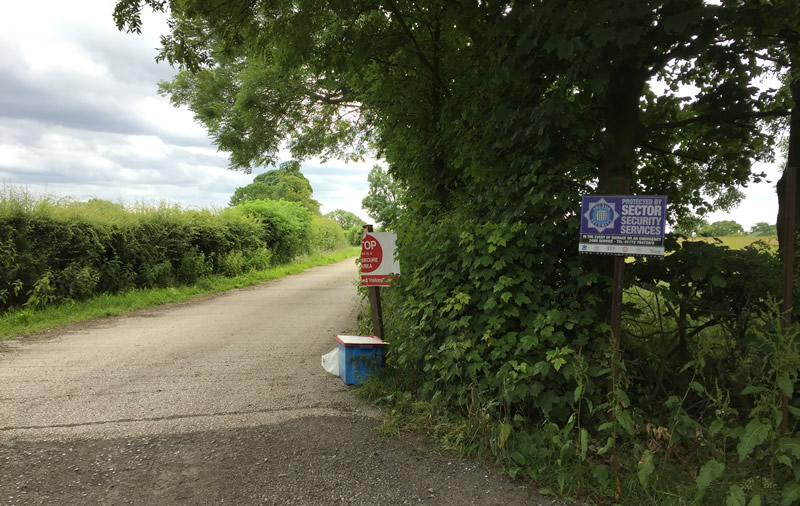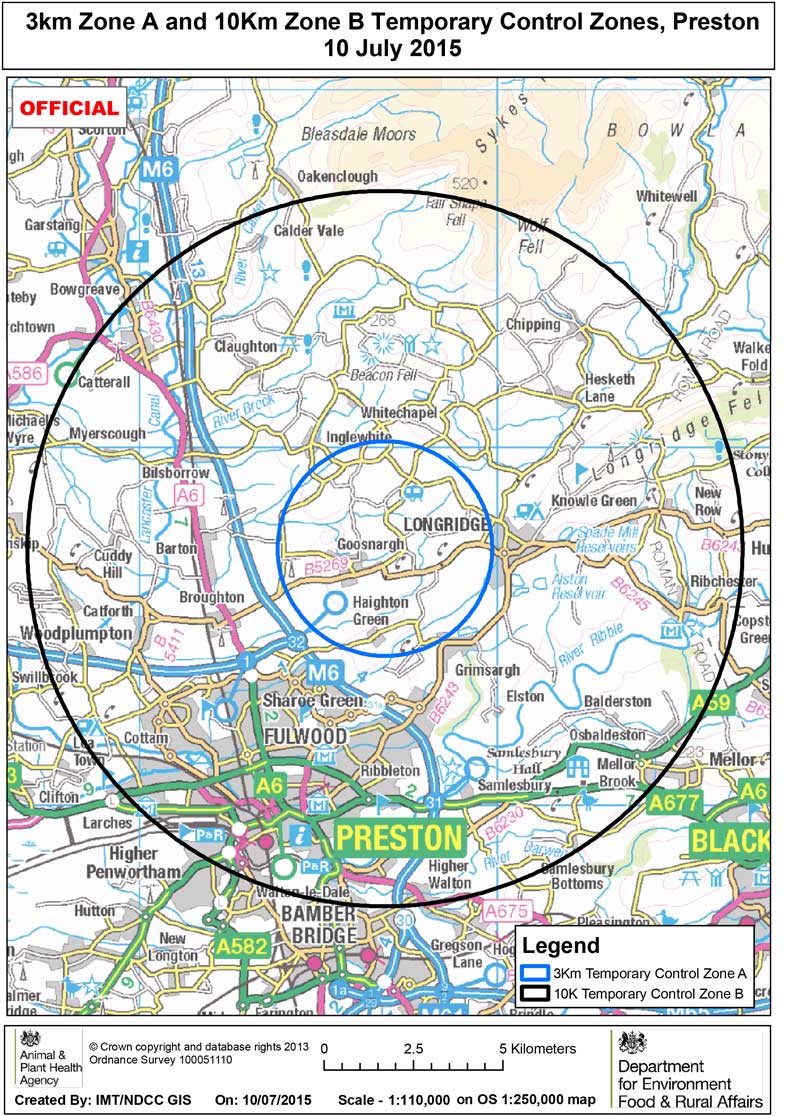
Nearly 200,000 laying birds are to be culled following a suspected outbreak of highly pathogenic avian influenza in Lancashire.
Tests are yet to confirm the presence of AI but the chief veterinary officer, Nigel Gibbens, has decided to go ahead with the cull on suspicion that bird flu is involved. A 10-kilometre restriction zone has been put in place around the affected farm, which is near Preston in Lancashire. The movement of poultry and other animals is currently prohibited with the 10-kilometre zone.
The Department for Environment, Food and Rural Affairs (Defra) said that the decision to take precautionary action had been taken based on the “clinical symptoms displayed by birds at the farm and emerging laboratory findings.” Testing is being undertaken and the results of those tests are now being awaited.
Defra is expected to formally confirm disease once all the results are known. While it should be known later today if it is a high pathogenicity strain, it will be later on Sunday (or possibly Monday) for the Neurominidase number.

Defra said in a statement that it had a strong track record of controlling and eliminating previous outbreaks of avian flu in the UK. Outbreaks in Yorkshire last year and Hampshire in February were both successfully contained, allowing restrictions to be lifted at the earliest opportunity, it said.
“We have taken swift precautionary action to limit the risk of disease spreading. These measures to control the movement of poultry and humanely cull birds at the farm are part of our tried and tested approach to deal with such incidents,” said Nigel Gibbens.
“The advice from Public Health England is that the risk to public health is very low. The Food Standards Agency has said there is no food safety risk for consumers.
“I would urge bird keepers to be vigilant for any signs of disease, report suspect disease to their nearest APHA (Animal and Plant Health Agency) office and to ensure they are maintaining good bio-security on their premises.”
Robert Gooch, director of policy with the British Free Range Egg Producers’ Association (BFREPA), has called on the chief vet to initiate a housing order for all birds in the region. “We would like all birds within a 50-kilometre zone at least to be housed. That would probably cover the whole of the North West.”
BFREPA members have previously called for birds to be housed as soon as an AI outbreak is confirmed as a means of preventing the spread of the disease. Robert said that BFREPA would like the UK authorities to follow the model used in the Netherlands, where all birds are immediately housed for at least 72 hours on the outbreak of bird flu.
Robert has also appealed to egg producers to take extra care with bio-security. He said it was well know that once an area was affected by bird flu the most likely cause of further contamination was human activity. “We would urge all producers to look carefully at their bio-security.”
Of the 170,000 birds involved in the cull, some 120,000 are in enriched cage production. The other 50,000 are free range birds.
Suspicions were first aroused when the layers suffered a drop in egg production and increased mortality. This was initially blamed on the weather, but a private vet was subsequently called in and, as mortality continued to increase, APHA was informed.
Chief Vet Nigel Gibbens said:
“We have taken swift precautionary action to limit the risk of disease spreading. These measures to control the movement of poultry and humanely cull birds at the farm are part of our tried and tested approach to deal with such incidents.
“The advice from Public Health England is that the risk to public health is very low. The Food Standards Agency has said there is no food safety risk for consumers.
“I would urge bird keepers to be vigilant for any signs of disease, report suspect disease to their nearest APHA office and to ensure they are maintaining good biosecurity on their premises.”
Anyone suspecting avian flu (bird flu) should immediately contact their nearest Animal and Plant and Health Agency (APHA) office.
BEIC have have formally requested that a housing order be put in place in the NW of England & W Yorkshire.
Things we know:-
1/ Initial reports suggested the outbreak was a suspected High Path H7 but this has now been amended to a suspected Low Path H7.
2/ It is estimated that 22,000 birds were culled this Saturday afternoon with culling due to continue on Sunday and take until Tuesday.
3/ 170,000 birds on site (all layers). 10 sheds - 120,000 colony cage (4 sheds) and 50,000 free range (6 sheds);
4/ Nigel Gibbons, CVO, has ordered a cull of the birds based on evidence of a notifiable disease i.e slaughter on suspicion;
5/ The cull is expected to commence tomorrow. It is not known how long the cull will take;
6/ A 10 km restriction zone has been established. Defra are to provide a map shortly of the location of the IP and the extent of the restriction zone;
7/ The N number is expected to be confirmed Sunday afternoon but N1 is ruled out;
8/ The Yorkshire duck farm was H5N8 and Hampshire H7. The main cause in the USA is H5N2;
The priority for APHA currently is to follow up on tracings. This takes time, but is vital to ensure that all avenues are covered to prevent any potential for further disease spread.
Defra are preparing licences (please see below), but these will not be activated until the CVO is satisfied that the potential for further disease spread is ruled out.
Zone A of the Temporary Control Zone is equivalent of PZ and Zone B equivalent of SZ.
• Saturday 11th - Movement of table eggs from premises in Zone A/ Zone B – general
• Saturday 11th - Meat produced from poultry originating outside Zone A/ Zone B – general
• Saturday 11th – movement of poultry into Zone A/ Zone B for slaughter at designated slaughterhouse – general/specific tbc
• Saturday 11th – movement of day-old chicks from hatchery within a Zone B – specific. Moves within England only
• Sunday 12th - Movement of mammals off poultry premises in the Zone A/ Zone B – specific tbc. Moves within England only
• Sunday 12th - movement of poultry to slaughter from premises in the Zone B – specific. Moves within England only
• Monday 13th – movement of hatching eggs from Zone B to a designated hatchery – specific. Moves within England only
• Monday 13th – movement of hatching eggs from Zone B to designated premises for use for scientific, diagnostic or pharmaceutical purposes – specific. Moves within England only tbc
Culling will start today. 4 CGUs have been sent to the site and catchers are now on site.
